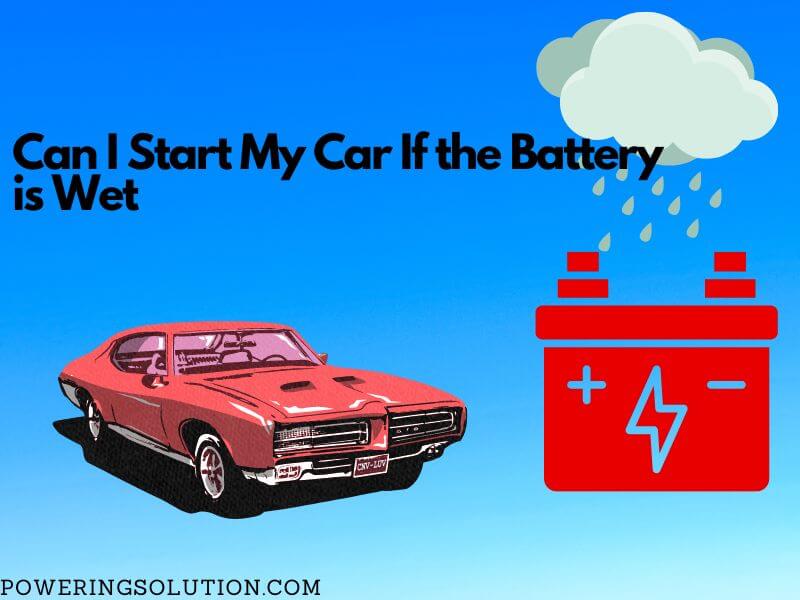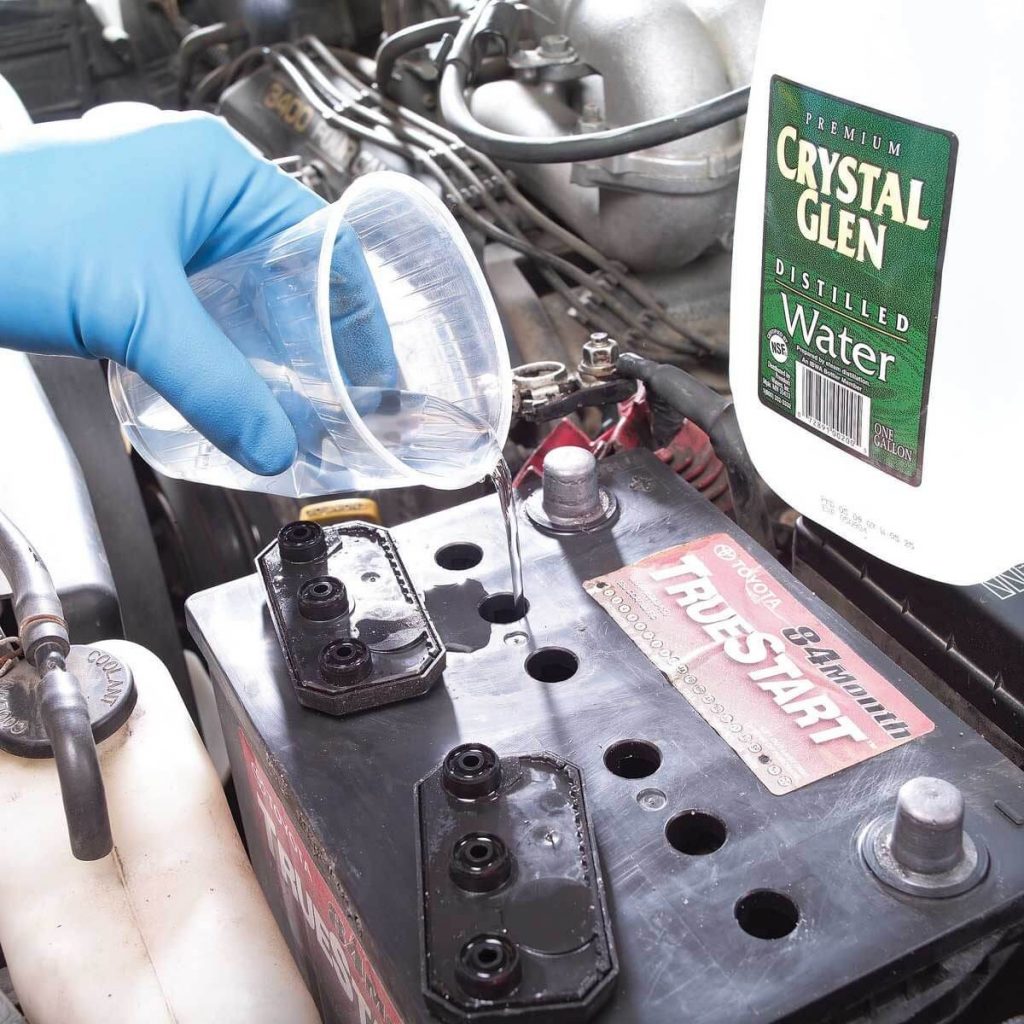If you have a wet battery, it’s best not to try and start your car. Water can cause all sorts of problems with electrical components, so it’s best to err on the side of caution. If you absolutely need to get your car started, there are a few things you can do.

Make sure that the water is not actually touching any of the electrical components. If it is, then you’ll need to dry those off before proceeding. Once everything is dry, you can try jump-starting your car.
If that doesn’t work, then you’ll need to replace the battery.
- If the battery is wet, first remove it from the car
- Clean the battery terminals with a wire brush to remove any corrosion
- Once the terminals are clean, dry them off and then reconnect the battery to the car
- Start the car and let it run for a few minutes to allow the alternator to recharge the battery
Is It Bad If a Car Battery Gets Wet?
A car battery is made up of a series of lead plates that are submerged in an electrolyte solution. When the engine is running, the alternator charges the battery and causes a chemical reaction that produces electricity. If the battery gets wet, this process is disrupted and can cause damage to the battery.
It’s not necessarily bad if a car battery gets wet, but it can be if the water is allowed to sit on the battery for an extended period of time. The water can corrode the lead plates and shorten the life of the battery. A damaged battery can drain your car’s power overnight. If you do get your car battery wet, be sure to clean it off as soon as possible and dry it completely before recharging it.
Is It Bad If a Battery Gets Wet?
If your battery gets wet, there’s a good chance it’s ruined. Water can damage the delicate internal components of a battery, causing it to short-circuit and become unusable.
There are some steps you can take to try and salvage a wet battery, but it’s always best to err on the side of caution and assume that any water damage is irreparable.
Let’s look at the step-by-step guideline to salvage a wet battery:
| First step | If you do decide to try and save your wet battery, be sure to unplug it from any devices or power sources immediately after it gets wet. |
| Second step | Then, remove the battery from its casing (if possible) and dry it off with a clean cloth. If the battery is removable, you can also try placing it in a container of uncooked rice; the rice will absorb any moisture from the battery. |
| Third step | Let the battery dry for at least 24 hours before attempting to use or charge it again. Even if you’re successful in reviving a wet battery, there’s no guarantee that it won’t fail prematurely in the future as a result of water damage. |
Note
So if your device is working without issue, it’s probably best to leave well enough alone and not risk damaging your device or voiding its warranty by trying to fix a problem that may not even exist.
Car Battery is Wet on Top
If you notice that your car battery is wet on top, it’s important to take action immediately. This is usually a sign that your battery is leaking acid, which can damage both your battery and your car. If you think your battery may be leaking, it’s important to have it checked by a professional as soon as possible.
In the meantime, there are a few things you can do to minimize the damage:
- Cover the battery with a towel or piece of cloth. This will help to absorb any acid that may be leaking out.
- Disconnect the negative terminal of your battery. This will prevent any further damage to your car’s electrical system. – If possible, remove the entire battery from your car and store it in a safe place until you can get it checked by a professional.
Water on Car Battery Terminals
Water can cause serious damage to your battery and may even lead to a fire. f you notice water on your car battery terminals, it’s important to take action right away:
| First step | The first thing you should do is disconnect the negative terminal of your battery. This will help prevent any further damage. Next, clean the terminals with a solution of baking soda and water |
| Second step | Clean the terminals with a solution of baking soda and water. Once the terminals are clean, dry them off and reconnect the negative terminal. |
Pro Tips
If you’re concerned about water damage, it’s a good idea to have your battery tested by a professional. They’ll be able to tell you if the water has caused any damage and whether or not you need a new battery.
Can You Charge a Car Battery in the Rain?
The quick answer is yes, you can charge a car battery in the rain. However, there are a few things to consider before doing so:
Make Sure the Area is Well Ventilated
For one, it’s important to make sure that the area around the charger and battery are well-ventilated. This is because charging a battery emits hydrogen gas, which is highly combustible. If there’s not enough ventilation, the hydrogen could build up and create an explosion hazard.
Keep the Charger Dry
It’s important to keep the charger itself dry. Most chargers have weather-resistant covers, but if yours doesn’t, you’ll need to take care to keep it dry while in use. Water and electricity don’t mix well, so getting the charger wet could create a dangerous situation.
Don’t Overcharge the Battery
Be sure to disconnect the charger once the battery is fully charged. Overcharging a battery can shorten its lifespan significantly. So long as you take these precautions into account, charging your car battery in the rain isn’t any more dangerous than charging it on a sunny day. Also, be careful while using different settings like a car alarm which can drain the battery.
Can Battery Terminals Get Wet

Most people don’t think twice about getting their battery terminals wet. After all, they’re just a couple of metal posts sticking out of the top of the battery, right? Wrong!
Battery terminals can absolutely get wet, and when they do, it’s not good news for your car. When water gets into contact with the battery terminals, it can cause all sorts of problems:
| Metal corrosion | It can corrode the metal, which can eventually lead to a loss of electrical contact between the terminal and the battery cable. This can make it difficult or even impossible to start your car. |
| Short circuit in the battery | Water can cause a short circuit within the battery itself, leading to a dangerous situation in which the battery could overheat or even explode. So if you’re ever tempted to wash your hands off after working on your car’s engine without first disconnecting the battery cables, resist the urge! |
Frequently Asked Question
Does Rain Affect a Car Battery?
It is a common misconception that rain can damage or affect a car battery. However, this is not the case! Rain does not cause any problems for car batteries, and they will continue to work properly even if exposed to moisture.
One thing that can affect a car battery’s performance in cold weather. Batteries tend to lose their charge faster in cold temperatures, so it’s important to make sure they are kept topped up in winter. Other than that, there is no need to worry about rain damaging your battery – it’s perfectly safe!
What Happens If a Battery Gets Wet?
If a battery gets wet, it can short-circuit and cause a fire. If the battery is in a device that is plugged in, it can also cause an electrical shock.
How Do You Dry Out a Wet Car Battery?
If your car battery is wet, it’s important to dry it out as soon as possible. A wet battery can short circuit and cause serious damage to your car.
The best way to dry out a wet battery is to remove it from the car and place it in a sunny spot.
If you can’t remove the battery, try using a hair dryer on its lowest setting to slowly dry out the battery. Once the battery is dry, clean any corrosion off of the terminals with a wire brush.
Can You Charge a Wet Car Battery?
A car battery should not be charged if it is wet. If a car battery becomes wet, the best course of action is to remove it from the vehicle and allow it to dry completely before attempting to charge it. Charging a wet battery can lead to damage or even an explosion.
What Happens If a Car Battery Gets Submerged in Water?
If a car battery gets submerged in water, it will most likely be damaged beyond repair. The water will cause the internal chemical reaction that produces electricity to stop working, and the battery will no longer be able to hold a charge.
Your car fob also won’t work with a dead battery. Even if the battery is dried out and appears to work again, it will probably only work for a short period of time before failing completely.
Conclusion
If your car battery is wet, it’s important to take the proper steps to clean and dry it before trying to start your car. If you don’t, you risk damaging your battery and causing other electrical problems.
Read more:
